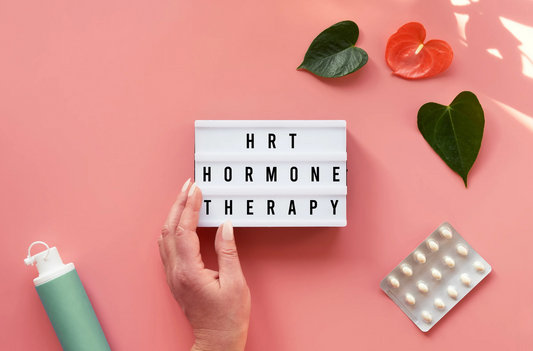Whether you’re taking hormone replacement therapy (HRT) during menopause or using hormonal contraception (such as the pill, patch, injection, or hormonal IUD), it’s important to understand how these treatments can affect your nutrient requirements.
Hormonal therapies influence metabolism, liver function, fluid balance, and how nutrients are absorbed, utilised, or excreted by the body. Over time, this can create subtle imbalances or deficiencies that may impact your energy, mood, immunity, and overall health.
B vitamins, particularly B6, B12 and folate, are often depleted with oestrogen-containing therapies. These vitamins are essential for mood regulation, brain health and red blood cell formation. Deficiencies can lead to fatigue, brain fog, and elevated homocysteine levels, which are linked to cardiovascular risk.
Magnesium is another mineral to watch. Oestrogen increases the loss of magnesium through urine, which may contribute to symptoms like anxiety, poor sleep, headaches, and muscle cramps. Supporting magnesium through food or supplementation can make a noticeable difference, especially during periods of stress.
Hormonal contraception may also reduce levels of zinc by increasing copper absorption. Zinc is crucial for skin, immune function, wound healing, and hormone regulation. Low levels can worsen acne, impair immunity, and affect sense of taste and smell.
Vitamin C and E, both powerful antioxidants, can also be depleted. These vitamins help combat oxidative stress, support collagen production, and enhance immunity. Without adequate intake, skin, immunity and energy levels can all be affected.
There’s also growing evidence that hormonal therapies may interfere with vitamin D metabolism. Given the importance of vitamin D for bone health, immunity and mood, it’s worth testing your levels regularly and supplementing as needed, especially in the cooler months (we strongly recommend an annual blood test to confirm your levels and supplementation dose).
Selenium and calcium are also worth noting. Selenium supports thyroid function and antioxidant defence, while calcium is essential for bone strength - especially during menopause, when oestrogen naturally declines. HRT can help preserve bone density, but calcium intake and weight-bearing exercise are still key.
Interestingly, the iron needs of women using hormonal contraception may be reduced due to lighter periods. However, this can also mask underlying iron issues, so checking ferritin and iron saturation levels is still worthwhile.
If you’re using HRT or hormonal contraception long-term, it’s wise to revisit your nutritional intake, and consider targeted supplementation if symptoms of deficiency arise. A balanced, nutrient-dense diet alongside regular blood testing will help support your wellbeing throughout all stages of hormonal change.
























